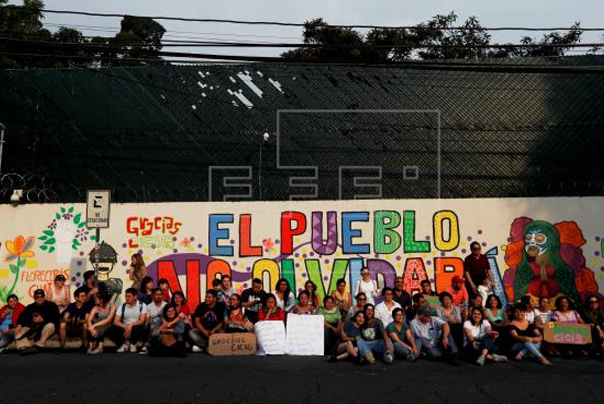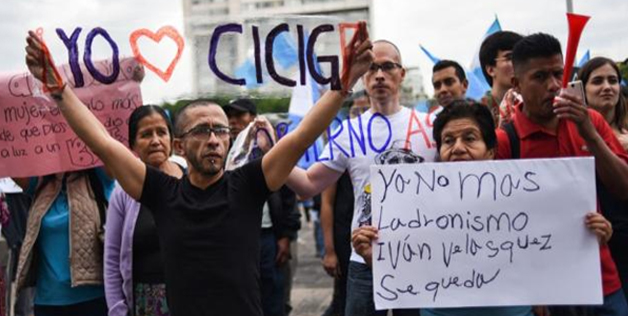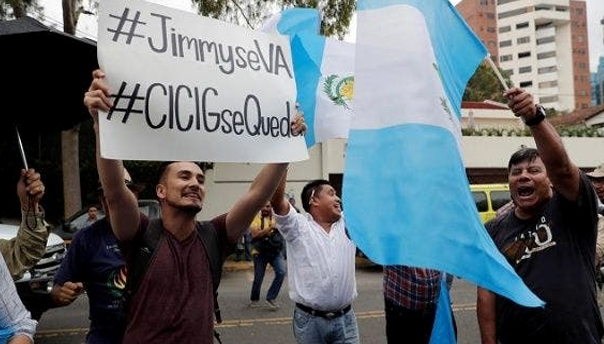By Nicole Gonzalez/GICJ

In September 2019, the International Commission against Impunity in Guatemala (CICIG) closed down its headquarters in the country, after former President Jimmy Morales refused to renew the CICIG’s mandate, bringing to a close one of the most successful bodies fighting against corruption in the region. Since then, President Morales’ and President Giammattei’s respective governments have pushed for further impunity for those individuals that should be brought to heel, despite each president’s promises to eradicate corruption and crime in the country.
BACKGROUND
The CICIG was established on December 12 2006, in a treaty-level agreement between the United Nations and the government of Guatemala due to a request for assistance from the government in the aftermath of the peace accords, as illegal armed groups began a new campaign in the countryside. The treaty established the CICIG as an independent international body meant to strengthen the rule of law in the country. The treaty was a step in the right direction, as it showed the Guatemalan government’s commitment to eradicating crime, bringing justice and stability to its people. Said treaty allowed the CICIG to conduct independent investigations, to submit public policy recommendations and to act as a complementary prosecutor. Thus, the CICIG was meant to work alongside the Public Prosecutor's Office (Procuraduría General de la Nación), the National Civilian Police (Policía Nacional Civil) among other state institutions. Its mandate was supposed to last 2 years, but was extended in April 2009 at the request of Guatemala’s then Minister of Foreign Relations, HaroldoRodas. Three more extensions were signed, by mutual agreement of the Guatemalan government and the UN, in January 2011, April 2015 and again in April 2016 – the last extension being signed at the beginning of President Morales’ term in office[1].
CICIG–SUCCESSES
The CICIG enjoyed a great rate of success during its time of operation, both when it comes to prosecution and assisting in lowering criminal and homicide activity in the country. In its 12 years working alongside the Public Prosecutor’s office, homicides were cut by 32%, 34 legal reforms were proposed to the government, 60 criminal networks were dismantled, and 680 individuals were indicted. Of these, over 310 were convicted for numerous crimes such as money laundering, fraud, trafficking, as well as members of the Zeta drug syndicate – among others.[2]Similarly, the share of homicides solved increased from just 7% in 2006 to 28% in 2013, thus increasing the efficacy of the law enforcement and judicial branches of the government.[3]More importantly, the CICIG’s biggest success came about due to their refusal to allow anyone to continue on with impunity, including those in the highest political offices in the country as well as those at the top of dangerous criminal and drug trafficking networks.

“The people do not forget. Thank you CICIG” - mural located in front of the headquarters of the CICIG, painted by citizens and social groups. Esteban Biba
The following table is a sample list of some of the high-profile cases they handled during their 12 years working in Guatemala.
|
Year |
Case |
Crime |
Summary |
|
2006 |
Pavón& PARLACEN |
Extrajudicial executions |
The case began on February 20th, 2007 when 3 Salvadorian diplomats, members of the Central American Parliament - PARLACEN - as well as their driver were brutally murdered. Since the identified killers were members of the police, the CICIG was the competent authority to collaborate with the investigations of the case. They connected this case to the murder of the same convicted policemen at the Pavón prison and the "Infiernito". The case led to a breakthrough which helped link important figures in Guatemala's main security apparatus who had men under their command and who were accused of various crimes such as assaults, extortion, kidnappings and "graves" of money and drugs, among other things. |
|
2008-2009 |
Alfonso Portillo |
Embezzlement |
The CICIG aided in the prosecution of former President Alfonso Portillo and several members of the military, who had been charged with embezzlement and corruption. The former Taiwanese ambassador, Andrew Wu, was implicated as they discovered his delivery of cheques to the former President. Portillo was extradited to the United States due to money laundering charges to be tried there. He returned to his home country in 2015 after he was released from prison. |
|
2008-2012 |
Adolfo Vivar |
Fraud |
The CICIG worked alongside the National Civil Police (PNC) and the Public Prosecutor's Office (MP) to capture and arrest Adolfo Vivar, the then-mayor of Antigua in Guatemala. Mr. Vivar was arrested alongside another 12 people, which included other municipality officials and the mayor's relatives. They were accused of criminal association, extortion, fraud, money laundering and interfering with the course of justice. The case uncovered the way various members of a criminal organization, of which the Mayor belonged took advantage of the municipality's public treasury to award contracts to next of kin, robbing the municipality of an estimated Q23 Million. |
|
2012 |
Marlene Blanco Lapola |
Extrajudicial executions |
The CICIG helped in the capture of the ex-Director of the National Civilian Police, Marlene Blanco Lapola as well as multiple members of the ministry of the interior as it was alleged that she and some working at the ministry were running a campaign of "social cleansing" against criminal suspects, thus engaging in extrajudicial executions.The case is still ongoing. |
|
2014 |
The Mendoza Family |
Drug trafficking |
The CICIG aided in the arrest of Harold Mendozaas well as some of his family members, and were all charged with forced displacement, illicit association and money laundering. The Mendoza family was known in the country as belonging to an elite criminal group. Allegedly, among other things, the family led a drug ring and controlled its own paramilitary force which was used for various economic reasons. However, there was not enough evidence for the latter. Thus, Guatemalan prosecutors built a case against his alleged illicit land seizures under which hundreds of thousands citizens suffered. 10 family members were sentenced, with the sentences ranging fromo 2 to 16 years in prison. |
|
2015 |
The IGSS-Pisa Case |
Contract Fraud |
The CICIG uncovered a large network of corruption within the Guatemalan Social Security Institute. Multiple members were captured for allegedly being involved in an anomalous signed with the pharmaceutical company PISA, through which services were provided to patients with renal diseases, and which was accused of causing the death of several patients due to deficient treatments, lack of cleanliness and other inadequacies at their facilities.There were a total of sixteen arrests, including that of the president of the IGSS board of directors, who was arrested for fraud and who was President Pérez’ private secretary. |
|
2016 |
Impunity & Fraud in the SAT |
Government fraud |
Investigators from the Department of Justice and the CICIG found, among a myriad of other evidence, detailed accounts of how bribe money paid by Aceros de Guatemala (a company) was distributed within the State’s tax collecting agency in order to get rid of a legal issue it had with this governmental body. Thus, various high-level officials and auditors of the Superintendencia de AdministraciónTributaria de Guatemala (the nation’s tax collecting organization) were accused and later arrested for illegally favoring the company Aceros, from whom several legal representatives were also arrested. |
|
2016 |
Co-optation of the State of Guatemala |
Government fraud |
The case was discovered,investigated, and prosecuted by the Department of Justice and the CICIG. The case snowballed from the investigations which first led into La Línea case. During the La Línea case, a fully formed criminal organization, which reached as high as former President Otto Pérez Molina, was discovered and prosecuted. From this first case, investigators were able to piece together an immense financial scheme, which reported fraud stretching back to 2008, which they thus began prosecuting. This second case revealed a money laundering scheme meant to enrich the Partido Patriota (patriotic party), which helped get the party into power via campaign money in 2011. Once in power, various government institutions were co-opted through this scheme. Thus, this widespread network was used to illegally enrich multiple members of government for many years. |
THE CICIG UNDER THE GOVERNMENT OF MORALES
Formerly a comedian, Jimmy Morales presented himself as different from the “crooked” politicians when running for office. His was an anti-corruption platform, given that, by this point, confidence in the Guatemalan government was very low due to decades of governmental corruption, crime and more. During his campaign, Jimmy Morales expressed support for the CICIG and its work on a number of times; however, this cooperative relationship came to an end as early as 2017, when President Morales declared the head commissioner of the CICIG, Iván Velásquez, as persona non grata. This declaration was reversed by the Constitutional Court of Guatemala due to its unconstitutionality and its overreach of the executive branch. Nonetheless, President Morales tried once again, in 2018, to refuse the re-entry of Mr. Velásquez into the country. The change in attitude on the part of Morales came about when the CICIG requested that his immunity be taken away, in order to be able to investigate his presidential campaign due to illicit campaign financing. According to the CICIG, it was likely that Morales accepted around 1 million dollars’ worth of donations from illegal sources (such as criminal and drug trafficking organizations). This came to a close after the arrest of Morales’ brother and one of his sons, due to money laundering and fraud.
Thus, as mentioned before, starting in 2017, President Morales began a campaign against the CICIG in order to end its presence in the country. He was successful in 2019, when he refused to renew the CICIG’s mandate, thus forcing the organization to dissolve after 12 years of service. It is important to note that, outside of his actions against the CICIG, Morales’ campaign included verbal attacks which also began in 2017 and went on long after the CICIG had left the country. The president and members of his government accused the CICIG of stepping beyond its mandate and accused it of committing human rights violations when conducting their investigations. Moreover, his government stated that the CICIG had an agenda when it came to choosing whom to prosecute. Morales went so far as to say that the CICIG only performed “selective and partial justice,” and that it had created a “system of terror… whereby those who think differently are persecuted”.[4] He also declared the organization a threat to the national security of the country and to its sovereignty.[5]
Based on this criticism, three things are important to note; first, while the CICIG was indeed an international organization, it did not have supranational powers in Guatemala – meaning it could not go over the state in order to make unilateral decision. The CICIG had the power to lead (independent)investigations but could not prosecute or detain of its own volition. The sole authority on that regard is the Public Prosecutor’s office who, incidentally, must also approve, and work with, the CICIG on any given investigation, Thus, this body was meant to serve only in a supporting capacity. Also important to note is the fact that, while it could recommended reforms to the legislation, it had no power to pass any laws on its own. Furthermore, the Guatemalan state itself agreed to give the CICIG recommendation powers in Articles II and VI of the agreement with the UN.[6]President Morales signed the renewal of this same mandate in 2017. Thus, the accusations of a violation of sovereignty are baseless as is the president’s accusations of the CICIG being a national security threat.
Second, there seems to be no evidence to support President Morales’ claim that there is bias when selecting who to prosecute, as the CICIG has investigated politicians of multiple political parties. From the right, as mentioned in the chart above,it helped the Public Prosecutor’s office investigate and later charge former president Otto Pérez Molina, his Vice President Roxanna Baldetti, and former president Alfonso Portillo. However, it has also investigated and prosecuted left-wing politicians such as former President Alvaro Colom and nine members of his cabinet, representative Nineth Montenegro and first lady and former presidential candidate SandraTorres – to name a few. When speaking about bias, it is also important to note that the CICIG does not have the power to emit a guilty verdict at court. Rather, the organization helps the prosecution build a case, meaning gather the evidence, which the prosecutors then use in trials held under Guatemalan courts and under Guatemalan law.
Lastly, to address the charges of human rights violation levelled at the CICIG by the Guatemalan government, it should be noted that there has never been a request – on the part of the judicial branch – to conduct an investigation on any CICIG official for witness intimidation or bribing. Instead, they have endorsed the witness protection program the CICIG recommended in order to fortify the already existent witness security program of Guatemala. Moreover, the CICIG has recommended and campaigned for detention laws to better accord with international standards and UN norms, thus promoting human rights for detainees. Thus, there is no legal evidence to justify President Morales’ accusation of any human rights violation by this UN commissioned body.
Tellingly, President Morales’ group of supporters was largely made up of wealthy, business elites, and some of the conservative parties in the country. In sharp contrast, in a study carried out by the Cid Gallup, they found that 71% of the population approved of the CICIG and its years of work. Moreover every 7 out of 10 people disapproved of Morales’ decision to expel the CICIG from the country without a mandate renewal[7].

GICIG supporters at a protest demanding the Government to let in Commissioner Ivan Velazquez (UN Human rights/Twitter)
IMPACT OF THE DISSOLUTION AND UN RESPONSE
The removal of the CICIG was condemned by the United Nations, not only because it meant putting an end to an organization whose sole job was to aid the Guatemalan government in fighting against corruption, crime and impunity, but also because of the way President Morales went about removing the CICIG. As mentioned, President Morales tried multiple times to remove the CICIG – most of the time resorting to unconstitutional methods which the UN condemned. Moreover, the UN and other human rights bodies noted the harmful message closing the CICIG sent within the country, as President Morales tried over and over again to work outside of the bounds of the law in order to walk away from his presidency with impunity over his alleged crimes. In other words, by closing the CICIG, President Morales closed the door on a chapter which had brought many corrupt politicians and criminals to heel in order to bring justice to the people of Guatemala. He put his personal benefit over the good of the people. The CICIG emboldened the people, who felt that justice would finally be restored in their country, and that the country would prosper with reduced levels of crime and corruption. The CICIG was a change in the right direction, which was shut down by those who continue to violate the rights of the people of Guatemala as they embezzle funds, commit fraud, make deals with dangerous drug trafficking organizations – among other crimes. This circle of injustice has deprived the people of Guatemala not only of a working judicial system, but has impoverished them and their communities, as money goes to criminal networks and other corrupt politicians instead of into welfare programs to better the quality of life of communities that oftentimes do not even have running water or electricity. Thus, the closing of the CICIG and president Giammattei’s refusal to revisit the organization’s mandate sets a grave precedent which the CICJ strongly condemns.
GUATEMALA POST-CICIG
In the year since the closure of the CICIG, there has been a heinous push for further immunity for criminals in the country, further infringing on the rights of the people of Guatemala. First, soon after the announcement of the closure of the CICIG, there was a push by certain members of congress to pass a law that would have given amnesty to all soldiers who participated in the almost 40-year civil war that occurred in the country and that have been charged with genocide and other crimes against humanity. While international as well as public pressure, which vehemently opposed the proposed law, won out in the end and the law was voted off, the very proposal shows the dangerous desire to trample over justice for victims and the people of Guatemala. It is unthinkable to release and pardon these criminals who committed such hateful crimes against the people of Guatemala for so many years.
In a similar move, last year,the Guatemalan government attempted to remove the immunity of 3 judges of the constitutional court, who blocked Morales’ unconstitutional attempts to remove the CICIG multiple times over the years. This would have endangered not only their ability to uphold the law but would have put the entire court in danger as removing the judges’ immunity would have allowed the President to remove those opposed to him at will. However, the Constitutional Court blocked his attempt at endangering it. Still, much like with the other attempts mentioned above, there have been constant attacks and attempts at neutering Justice in order to let rampant impunity overtake the system, destroying the people’s confidence in their government and infringing on their rights as criminal acts against them become more and more permissible.
Lastly, earlier this year it was discovered in an investigation that, once again, criminals and criminal groups are trying to co-opt the justice system, under the government of President Giammattei. Their strategy has gone as far as to interfere with the election of members for 2 different senior courts, as well as for positions in the Supreme Court in order to have their preferred judges on the bench. One of the many mentioned in the report, presented by the FiscalíaEspecializada Contra la Impunidad – FECI (Attorney General’s Office anti-impunity unit), stated thatAlejosCámbara, currently in jail for corruption, had attempted to influence the selection process by meeting with deputies, potential judicial nominees and other officials.

#JimmyLeaves#CICIGstays. Protesters gather to demand a resignation from Morales /Routers
Thus, despite a change in government, corruption continues to be rampant. Moreover, President Giammattei has made it clear he has no intention of reopening the CICIG and refuses to consider the possibility of an independent investigative body. Much like his predecessor, and many other presidents before him, President Giammattei is setting a precedent where justice is not the goal the government strives for, but rather a continuation of the corrupt system which has not yet been fully dismantled.
CONCLUSION
Guatemala has a history of impunity in favor of criminal organizations which has left its people with little to no trust in their government. The CICIG was a step in the right direction, bringing hope to many Guatemalans that the system could be reformed, and that justice could be served. During its years of work, the CICIG – alongside the Public Prosecutor’s office –fought admirably to dissolve criminal organizations and hold to account those benefiting from the suffering of the people of Guatemala, in the process going head to head with many powerful figures at the very top of the political system. However, with the closing of the UN-backed organization, the return of total impunity sadly seems to be the goal of many politicians.
GICJ calls on the Guatemalan government to reevaluate its stance on the possibility of a new independent investigative body that can help keep in check those that would abuse the system through embezzlement, fraud, and other forms of corruption. The CICIG was a good first step which helped showcase what an independent judiciary system could look like.Thus, its disbandment should mean that the government is ready to create or strengthen its domestic institutions so that they can take on the role the CICIG played for over a decade in the country and not, as we have seen, take it as permission to curtail back justice.
The GICJ recognizes the necessity of effective and independent domestic bodies that function beyond an international agreement, which not only can create a dependence on an external body but whose work can be easily terminated. Thus, the GICJ believes that the Guatemalan government must work to strengthen the laws in place to ensure accountability at every level of government, as well as in private life. First, it should look to facilitate the work of the Special Prosecutor’s Office against Impunity (FECI) so that ongoing investigations are not ignored. Second, legal reform is necessaryto ensure that judges remain independent from the executive and legislative branches and that they remain protected from retaliation from criminal organizations. Moreover, recommendations left by the CICIG regarding better investigative techniques, and the witness protection program, should be followed in order to strengthen confidence in the system. Finally, the people themselves must continue to promote greater accountability through civil society in order to monitor the different government entities.
Thus far, the government of Guatemala has shown no interest in fighting for justice nor the will of its people. A change in attitude is long overdue, as the trust of the Guatemalan people and their safety hang in the balance.
[1]UN. (n.d.). CICIG. Retrieved May, 2020, from https://dppa.un.org/en/mission/cicig
[2] Crisis Group. (2019, August 29). Saving Guatemala's Fight Against Crime and Impunity. Retrieved June, 2020, from https://www.crisisgroup.org/latin-america-caribbean/central-america/guatemala/70-saving-guatemalas-fight-against-crime-and-impunity
[3] Ibid.
[4]Morales, J. (Jan 7, 2019). Press Conference. Retrieved from https://www.youtube.com/watch?v=pgs4q06Q9cQ
[5] Press, T. (2018, August 31). Guatemala's President Shuts Down Anti-Corruption Commission Backed by U.N. Retrieved from https://www.nytimes.com/2018/08/31/world/americas/guatemala-corruption-commission-morales.html
[6]Agreement, C. I. C. I. G. (2006). Agreement between the United Nations and the State of Guatemala on the Establishment of an International Commission Against Impunity in Guatemala (‘CICIG’). New York City, NY. Available at: http://cicig. org/uploads/documents/CICIG_AGREEMENT_EN. pdf
[7]Barreto Villeda, B. (2019, April 11). Mayoría está a favor de que siga la Cicig. Retrieved from https://www.prensalibre.com/tribuna/plus/mayoria-esta-a-favor-de-que-siga-la-cicig/












